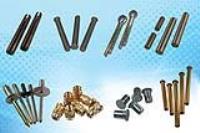 Add My Company
Add My Company
Sign In

In the engineering lexicon rivets and pins are commonplace and are fundamental to location, e.g. by use of dowels or groove pins and slotted steel tension pins. Similarly, Challenge Europe ex-stock delivery reflects the everyday usage of simple security fixings such as split cotter pins as well as the wide range of weld studs, self-clinching pins, brass threaded inserts and the many types of rivet in daily use. The experienced team at Challenge Europe are optimally positioned to advise on new or specialist applications and very much welcome talking to engineers before product finalisation, or at revision stages.
Common rivet forms available from Challenge Europe include blind “POP” rivets, solid, tubular style and self-clinching pins.
Blind rivets offered by Challenge Europe include: Open Ended which provide strong, low cost fastenings ideal for a wide range of applications within the general engineering industry. They are available in aluminium, steel, stainless steel, monel and copper; also closed (Sealed) End which are specifically designed to provide a waterproof seal after the rivet has been set and are available in aluminium, steel, stainless steel, and copper. Multigrip rivets are designed to clamp a wide range of material thicknesses as well as having excellent filling characteristics where the hole form proves inconsistent.
Traditionally multigrip rivets are available in aluminium, but steel and stainless steel versions have been recently introduced albeit with a very much reduced range of sizes and head styles... Structural rivets are designed to provide high tensile and shear strengths for more demanding applications and are available in steel and aluminium. Grooved rivets can be used in conjunction with fibrous materials such as wood where upon setting the aluminium body of the rivet expands and the grooves bite into the material. For load spreading special rivets are suitable for soft or brittle materials where upon setting the aluminium rivet body folds back into segments preventing damage. Peel rivets are similar to the load spreading rivet in design and application, except that the rivet body splits open into a ‘petal’ arrangement upon setting, they are also in aluminium.
Solid Rivets are generally manufactured to suit individual customer’s requirements, and are almost infinitely variable in terms of diameter, length, head form and material type. They are considered to be the strongest of the rivet types, but require high setting forces and sometimes more specialised setting tooling. Semi-Tubular rivets preserve the shear strength of solid rivet but with easier setting. They are generally available with oval, countersunk or tinman heads and in a variety of sizes and materials to suit customer applications. Tubular rivets are similar to the semi-tubular variety, but with a fully hollow shank and are designed for lighter setting force. Bifurcated style rivets are sometimes known as split rivets, being generally used on softer materials such as leather and composite timber boards, where they act in a self-piercing manner and can be designed to self-set.
For more information on Challenge Europe Rivets and Pins and Weld Studs and other fasteners talk to Challenge (Europe) Ltd
Enquire Now
More News
List your company on FindTheNeedle.

